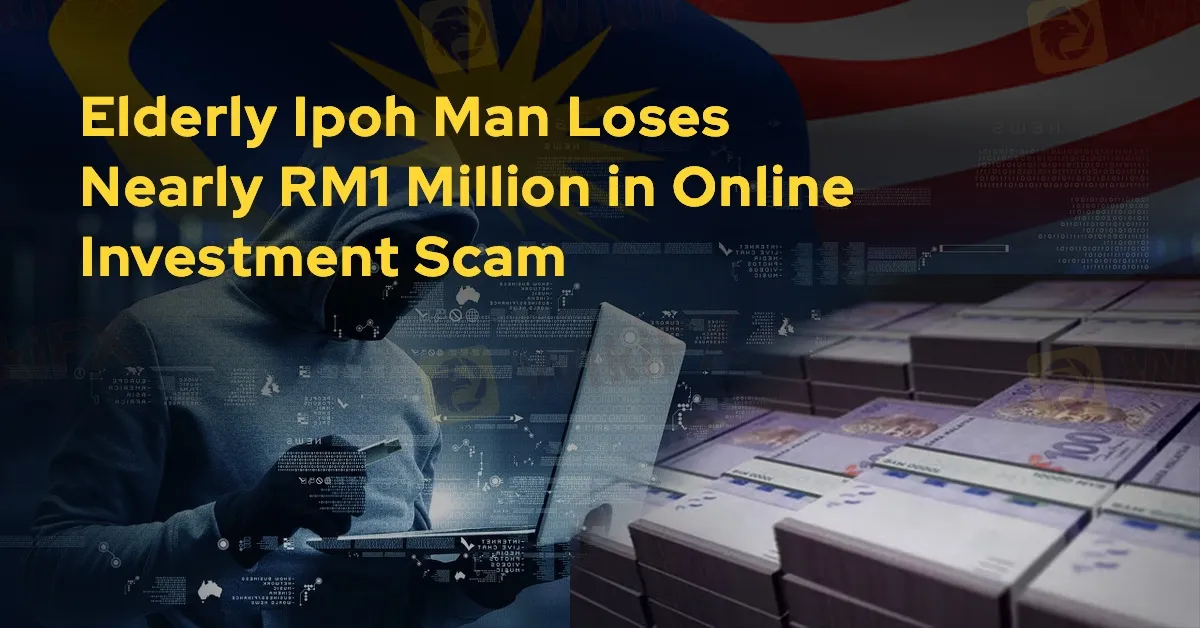简体中文
繁體中文
English
Pусский
日本語
ภาษาไทย
Tiếng Việt
Bahasa Indonesia
Español
हिन्दी
Filippiiniläinen
Français
Deutsch
Português
Türkçe
한국어
العربية
Elderly Ipoh Man Loses Nearly RM1 Million in Online Investment Scam
Abstract:An elderly man in Ipoh, Malaysia, has fallen victim to an online investment scam, losing RM974,000 in the process. The 67-year-old’s ordeal came to light after he lodged a report with the Ipoh district police on January 11, 2025.

An elderly man in Ipoh, Malaysia, has fallen victim to an online investment scam, losing RM974,000 in the process. The 67-year-olds ordeal came to light after he lodged a report with the Ipoh district police on January 11, 2025. Acting Perak police chief DCP Zulkafli Sariaat confirmed the case in a public statement.
The victim first encountered the fraudulent scheme on Facebook on December 4, 2024. While browsing the platform, he saw an advertisement for a stock investment opportunity that promised a 20 per cent return on an initial RM5,000 investment within just 30 minutes. The seemingly lucrative offer caught his attention, leading him to click on the provided link.

The link, shared by a female suspect, directed the victim to a WhatsApp group named the “National Malaysian Finance Management Association.” He was subsequently instructed to download an app called PGLO.PRO. Convinced by the promises of high returns, the victim made 16 online payments amounting to RM974,000, transferring the funds to three different bank accounts.
The deception came to light in January 2025, when the victim conducted a Google search and discovered that the investment scheme was non-existent.
DCP Zulkafli urged the public to exercise caution when dealing with investment opportunities, particularly those promising unusually high or quick returns. He emphasised the importance of verifying whether the companies involved are registered with regulatory bodies such as the Securities Commission Malaysia, Bank Negara, or the Companies Commission of Malaysia.

Unregulated or suspicious investment offers, especially those advertised on social media, pose a significant risk to unsuspecting investors. To mitigate such risks, individuals are encouraged to use platforms like WikiFX, a global broker regulatory query tool available on Google Play and the App Store.
WikiFX provides essential information about brokers, including their regulatory status, user reviews, and safety ratings. The platform enables potential investors to verify the legitimacy of financial entities before committing their money. Its comprehensive database, risk alerts, and regulatory updates offer an added layer of protection, empowering users to make informed financial decisions. By leveraging tools like WikiFX, investors can safeguard their hard-earned savings and avoid the devastating consequences of fraudulent investment schemes.

Disclaimer:
The views in this article only represent the author's personal views, and do not constitute investment advice on this platform. This platform does not guarantee the accuracy, completeness and timeliness of the information in the article, and will not be liable for any loss caused by the use of or reliance on the information in the article.
Read more

Forex Brokers vs. Crypto Exchanges: Which Is Safer for Traders?
The world of trading offers two major platforms: forex brokers and cryptocurrency exchanges. Both provide opportunities, but they also come with risks. Traders often wonder which is the safer option. While some lean towards traditional forex brokers, others trust the decentralised nature of crypto exchanges. Let us know if you are #TeamForex or #TeamCrypto!

The Yuan’s Struggle: How China Plans to Protect Its Economy
China introduced new measures on Monday to support its weakening currency, the yuan, amidst mounting economic and political pressures. The government announced plans to boost foreign exchange reserves in Hong Kong and ease borrowing restrictions for companies to improve capital flows.

XTB Secures UAE and Indonesia Licenses, Expands in 2025
XTB accelerates global growth in 2025 by securing key licenses in the UAE and Indonesia, paving the way for broader services and innovative offerings worldwide.

CFTC Orders Mosaic to Pay Over $1 Million for Fraudulent Crypto Scheme
The U.S. Commodity Futures Trading Commission (CFTC) has recently filed a significant lawsuit against Mosaic Exchange Limited and its CEO, Sean Michael, alleging a fraudulent digital asset commodity scheme that occurred between February 2019 and June 2021.
WikiFX Broker
Latest News
Wolf Capital Exposed: The $9.4M Crypto Ponzi Scheme that Lured Thousands with False Promises
Confirmed! US December non-farm payroll exceeded expectations
Spain plans 100% tax for homes bought by non-EU residents
90 Days, Rs.1800 Cr. Saved! MHA Reveals
The Yuan’s Struggle: How China Plans to Protect Its Economy
LiteForex Celebrates Its 20th Anniversary with a $1,000,000 Challenge
400 Foreign Nationals Arrested in Crypto Scam Raid in Manila
Singapore Blocks Polymarket Access, Following U.S. and France
OneZero Collaborates with Ladies Professional Golf Association (LPGA)
Housewives Scammed of Over RM1 Million in Gold Investment Fraud
Currency Calculator






